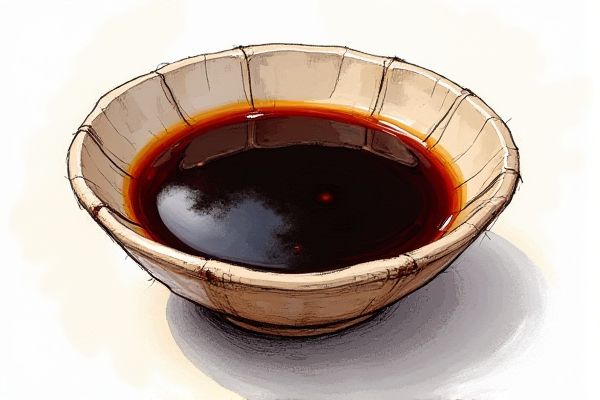Dashi, a traditional Japanese soup stock, is a foundational element in many Japanese dishes, known for its rich umami flavor. As culinary enthusiasts explore authentic Japanese cuisine, choosing the right brand of dashi becomes essential. From renowned Japanese names like Kayanoya and Shimaya, which have been perfecting their recipes for years, to newer entrants providing innovative blends, there is a wide array of options catering to different tastes and dietary preferences. Curious to find out which brands stand out and where to find them? Read on to discover our curated list of the best dashi brands available.

Illustration of dashi
Best brands of dashi in 2025
Kikkoman
Kikkoman, a leading brand in the Japanese condiment market, is renowned for its high-quality dashi and soy sauce products. In fiscal 2000, Kikkoman maintained a significant 28% market share in the Japanese soy sauce market, driven partly by increasing industrial-use demand. The company's Hon Tsuyu, a soup and sauce base, is a popular choice for making dashi, reflecting the growing demand for soy sauce derivative products, which saw an upward trend due to the increasing number of women in the workforce. Kikkoman's strategy to expand sales in the foodservice and industrial-use markets, as well as its focus on soy sauce derivative products, has been instrumental in its market dominance. The brand's premium soy sauce, Marudaizu Shoyu, holds a dominant 60% share in the premium soy sauce market. For more information, you can read their financial report.
Ajinomoto
Ajinomoto is a leading global brand renowned for its high-quality seasonings and flavor enhancers, particularly in the production of dashi, a fundamental component of Japanese cuisine. Established in 1909, Ajinomoto has expanded its operations to 34 countries and employs over 34,615 people as of 2023. The company's yearly revenue in 2023 is approximately ¥1.44 trillion JPY or $9.1 billion USD. Ajinomoto's seasonings, including its flagship product AJI-NO-MOTO, hold significant market shares globally, with a dominant presence in umami seasonings, especially in countries like Vietnam and the Philippines where it holds around 60% and 100% market share respectively. For more detailed information, you can view Ajinomoto's Fact Book (PDF).
Shimaya
Shimaya is a renowned brand in Japanese cuisine, celebrated for its high-quality instant dashi, "Dashi-no-moto," which has been a staple since 1964. This innovative product makes home cooking easier and quicker, enhancing dishes with a rich "umami" flavor. Shimaya's dashi is widely used in various Japanese recipes, including soups, stews, and seasoning for rice and vegetables. The company's products are manufactured in Shunan, Yamaguchi prefecture, ensuring a natural flavor of dried bonito without added heat. Shimaya's dashi is available in both powder and granule types, catering to different needs and preferences.
Hana Katsuo
Hana Katsuo, a premium brand in the production of katsuobushi, is renowned for its high-quality dashi, a foundational element in Japanese cuisine. Produced primarily in Makurazaki, Kagoshima Prefecture, Hana Katsuo's output accounts for a significant portion of Japan's total katsuobushi production, with the city producing 43% of the country's katsuobushi between 2007 and 2008. The traditional production process, perfected during the Edo period, involves a complex manufacturing process including fermentation and maturation. Despite EU regulations initially banning katsuobushi due to benzopyrene content, innovative methods have been developed to comply with these regulations, ensuring global availability. Hana Katsuo's products are highly sought after, particularly in Europe, where demand is driven by the rising popularity of Japanese cuisine. For more information, visit the Tokyo Foundation's detailed research on their production process.
Marutomo
Marutomo is a renowned brand in Japan, celebrated for its high-quality dashi products, particularly the Katsuo Dashi Powder, which is made from dried bonito fish flakes and is a staple in many Japanese dishes, including miso soup and udon noodle soup. This product is prized for its rich umami flavor, enhancing the savory taste of various Japanese culinary creations. Marutomo's dashi powder is widely used by top chefs and restaurants, highlighting its excellence in the culinary world. The product is available in various packaging sizes, such as 1kg, and is exported globally, reflecting its international appeal. With its origins in Japan, Marutomo's dashi powder is a testament to the country's rich culinary heritage.
Yamaki
Yamaki is a renowned brand in Japan, celebrated for its superior quality dashi products, boasting a 95% corporate recognition and the number one mind share in liquid concentrated Japanese noodle soup base and boiled and dried-smoked skipjack tuna flakes, as per a 2021 survey by Dentsu Inc. With over 100 years of history since its establishment in 1917, Yamaki has grown into a leading food manufacturer, particularly in the smoke-dried fish shavings industry. The company ensures high food safety standards through its ISO9001-based management system and FSSC22000 certification for several of its plants. Yamaki's products, such as Men Tsuyu and Kappo Shiradashi, are characterized by their mellow aroma and strong umami flavor. The company's commitment to quality and safety has made it a trusted name in Japanese cuisine.
Itohan
ITO EN, while primarily known for its tea products, does not specifically produce or market dashi, a traditional Japanese soup stock. However, if we were to consider a hypothetical scenario where ITO EN ventured into dashi production, their expertise in leveraging high-quality ingredients and their strong market presence could make them a significant player. For instance, ITO EN's focus on profitability and product quality, as seen in their core Oi Ocha brand which has sold over 40 billion bottles since its launch in 1989, could translate well to the production of premium dashi. Their ability to expand sales routes and integrate products into local food cultures, with Oi Ocha now sold in 40 countries, suggests they could effectively market and distribute dashi globally. Additionally, their commitment to customer satisfaction and continuous improvement could ensure a high standard of quality in their dashi products. To learn more about their diverse offerings, visit ITO EN's global website.
Kaneso Tokuyou
Kaneso Tokuyou is renowned as one of the best producers of dashi, leveraging 100% domestic Japanese ingredients such as katsuobushi from Kagoshima Prefecture, dried sardines from the Seto Inland Sea, and kombu kelp from Hokkaido. Their dashi stock packets, developed in collaboration with Ota Memorial Hospital Neurology Center, are free from salt, MSG, and chemical seasonings, making them a healthier option. Since the release of their first tea-bag type dashi "Flavor Packets" in 1962, Kaneso Tokuyou has expanded its sales channels and built multiple factories, including the second factory in Mobira Industrial Park in 1975. Their commitment to traditional methods and high-quality materials ensures a rich and profound umami flavor. With a history spanning over 100 years, Kaneso Tokuyou continues to innovate while maintaining the essence of Japanese cuisine. For more information, visit their official store page.
Ninben
Ninben is renowned as one of the best producers of dashi, offering high-quality, concentrated Japanese dashi broth. Their Shiro Dashi, which translates to "white dashi," is made from ingredients such as bonito flakes, mackerel flakes, and kombu from Hokkaido, ensuring an authentic flavor. A 500ml bottle of Ninben Shiro Dashi can make up to 5 liters of stock, and it is free of chemical additives and high fructose corn syrup. The product is highly versatile, suitable for various Japanese dishes like oden, nabemono, and osuimono, with recommended dilution ratios provided for each. Ninben's dashi is also praised for its ease of use and rich flavor profile. For more details, you can explore their Shiro Dashi product page.
Riken
Riken Vitamin is a leading producer of dashi-related products, particularly notable for its scallop extract, which it began commercializing in 1976 by utilizing formerly discarded scallop broth. The company holds the top market share in Japan for scallop extract and uses this as a key flavor ingredient in various products, including Riken Non-Oil Aojiso and Wakame Soup. Riken Vitamin's innovative approach to using natural materials, such as molecular distillation technology developed in 1953, enhances the value of its products. The company's domestic food business, which includes these dashi products, accounts for 64% of its net sales, with a significant portion coming from household and commercial food segments.
















Leave a Reply
Your email address will not be published.